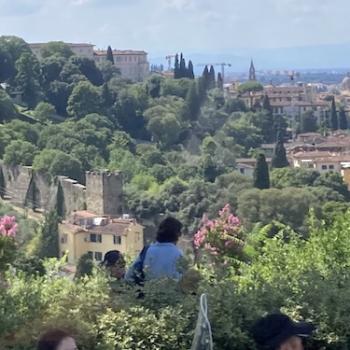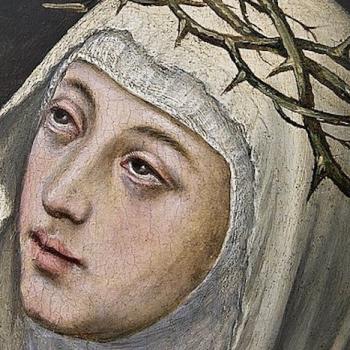
The Nazarenes and Wesleyans who first gave shape to my faith taught me to care deeply about holiness. When I was reconverted, as a young man, it was largely through the discovery of a deep and rich language of holiness in Saint Augustine. “Seek his face always,” says one of his favorite Psalms (105:4). I became convinced that the features of holiness that comprise God’s face are the same features that can come to shine out from the lives of creatures. And not only convinced: I came to find myself captivated by the attractiveness of that idea. I was, as Augustine might have put it, in love with the possibility that holiness names the deep connection of God with everything that is.
What I have learned about holiness in my life can be said fairly easily, though of course the proof of the learning is the pudding of the living.
1. We become by grace what God is by nature.
This is a key teaching of the early church, articulated by the great Athanasius. God just is holy, and holiness is a summary word for everything that God is. God is love, wisdom, goodness, faithfulness, power…. And all of that and more is what we mean when we say “holy.” Everything that scripture, tradition, life experience, and thoughtful reflection on the life, death, and resurrection of Christ teach us about the divine nature is a way of filling out that definition.
Questions: Why does God create? Become a human? Open the possibility for grace among estranged friends?
Answer: Because God is holy.
God is that, by nature. By a gift of that holy God, we can become that. When I am faced with the choice to act in a loving or a hateful way, I can choose love. Why? Because the God who is holy love is at that moment sharing that attribute with me. It is a gift, and by receiving it I also become it. “Be holy,” Leviticus says, “as I am holy.” This is the primary gift-event that comprises the Jewish and Christian faiths.
2. Time is the friend, not the enemy, of a holy life
Time, Plato said, is the moving image of eternity. It’s what eternity looks like, once you spread it out as past, present, and future. Or to change the image: eternity is all the notes of all the octaves, in a transcendent and perfect harmony. Time is the piano keys lined up so we can play them one or two or three at a time.
It might seem that time is the enemy of holiness. If I could live without fear of going hungry or losing a loved one tomorrow, I could surely be more loving, wiser, better, or more faithful, today. But that assumes that it’s not good to be a creature with limits of time and ability. This, it turns out, is an unbiblical assumption. God makes all those limits, and calls them “good.”
This means holiness involves learning to live with, and sometimes to overcome, the parts of life that bring out the worst in us. Fear, usually. Fear is the great enemy of holiness. Sometimes the fear defeats the quest for a holy life. But not always. Therein lies the miracle.
Habits
Contemporary psychology is giving a great gift to theology, in studying human brains and behavior and showing us how change works and what makes change difficult. One of the key insights I’ve gained: we often try to change behavior as if we were a god with unlimited willpower. We are not. We are smallish creatures who live in time. So we need to learn to set small intentions. Then we need to arrange the architecture of our lives to put these small intentions within easy reach. Finally, we need to give ourselves little celebrations when we reach them.
So becoming good at holiness, as Thomas Aquinas already knew, is about forming habits. The same parts of our brains that can get us to the gym and have us putting our keys in the same place when we walk in the door can form us to respond to criticism with patience, or to express joy rather than jealousy at the accomplishments of a colleague. This is the way of holiness.
3. Careful attention to the testimonies of others is the only reliable path to holiness.
I once wrote a little systematic theology centered on the story of the Emmaus disciples. It occurs to me that one might similarly write a theology of holiness centered on the parable of the Good Samaritan. What do we notice, or fail to notice, in the presence of creaturely life around us? To hear the holy call of the one in the ditch is, I think, to gain practice in the habit of hearing the holy call of God.
Can we listen for the testimony of Scripture, in the many ways that it wants to capture our imagination and lead us into the presence of Israel’s God? Can we listen for the testimony of our own bodies and voices, alongside those of our neighbors, as we gather for worship? The voices of the saints and companions who have gone before or go alongside us? These become the call to holiness, if we have ears to hear it.
So there’s my summary. We become holy by grace, as God is holy by nature. Time is our friend, not enemy, as we practice the tiny habits of the holy life. The presence and experience of others is the gift that, if we can hear it, is constantly inviting us to take on the features of the divine face.
That is all I know of holiness.










